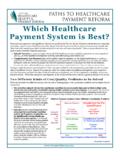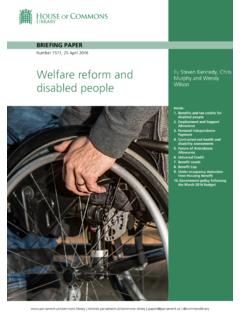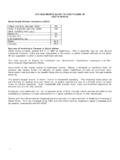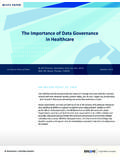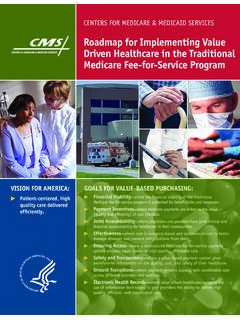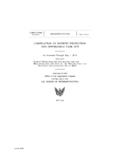Transcription of Application of Market Reform and other Provisions of the ...
1 1 Application of Market Reform and other Provisions of the Affordable Care Act to HRAs, Health FSAs, and Certain other Employer healthcare Arrangements Notice 2013-54 I. PURPOSE AND OVERVIEW This notice provides guidance on the Application of certain Provisions of the Affordable Care Act1 to the following types of arrangements: (1) health reimbursement arrangements (HRAs), including HRAs integrated with a group health plan; (2) group health plans under which an employer reimburses an employee for some or all of the premium expenses incurred for an individual health insurance policy, such as a reimbursement arrangement described in Revenue Ruling 61-146, 1961-2 CB 25, or arrangements under which the employer uses its funds to directly pay the premium for an individual health insurance policy covering the employee (collectively, an employer payment plan); and (3) certain health flexible spending arrangements (health FSAs).
2 This notice also provides guidance on section 125(f)(3) of the Internal Revenue Code (Code) and on employee assistance programs or EAPs. The Departments of the Treasury (Treasury Department), Health and Human Services (HHS), and Labor (DOL) (collectively, the Departments) are continuing to work together to develop coordinated regulations and other administrative guidance to assist stakeholders with implementation of the Affordable Care Act. The guidance in this notice is being issued in substantially identical form by DOL, and guidance is being issued by HHS to reflect that HHS concurs in the Application of the laws under its jurisdiction as set forth in this notice.
3 II. BACKGROUND A. Health Reimbursement Arrangements An HRA is an arrangement that is funded solely by an employer and that reimburses an employee for medical care expenses (as defined under Code 213(d)) incurred by the employee, or his spouse, dependents, and any children who, as of the end of the taxable year, have not attained age 27, up to a maximum dollar amount for a coverage period. IRS Notice 2002-45, 2002-02 CB 93; Revenue Ruling 2002-41, 2002-2 CB 75. This reimbursement is excludable from the employee s income. Amounts that remain at the end of the year generally can be used to reimburse expenses incurred in later years.
4 HRAs generally are considered to be group health plans within the meaning of Code 9832(a), 733(a) of the Employee Retirement Income Security Act of 1974 (ERISA), and 2791(a) of the Public Health Service Act (PHS Act) and are subject to the rules applicable to group health plans. 1 The Affordable Care Act refers to the Patient Protection and Affordable Care Act (enacted March 23, 2010, Pub. L. No. 111-148) (ACA), as amended by the Health Care and Education Reconciliation Act of 2010 (enacted March 30, 2010, Pub. L. No. 111-152), and as further amended by the Department of Defense and Full-Year Continuing Appropriations Act, 2011 (enacted April 15, 2011, Pub.)
5 L. No. 112-10). 2 B. Employer Payment Plans Revenue Ruling 61-146 holds that if an employer reimburses an employee s substantiated premiums for non-employer sponsored hospital and medical insurance, the payments are excluded from the employee s gross income under Code 106. This exclusion also applies if the employer pays the premiums directly to the insurance company. An employer payment plan, as the term is used in this notice, does not include an employer-sponsored arrangement under which an employee may choose either cash or an after-tax amount to be applied toward health coverage. Individual employers may establish payroll practices of forwarding post-tax employee wages to a health insurance issuer at the direction of an employee without establishing a group health plan, if the standards of the DOL s regulation at 29 (j) are met.
6 C. Health Flexible Spending Arrangements (Health FSAs) In general, a health FSA is a benefit designed to reimburse employees for medical care expenses (as defined in Code 213(d), other than premiums) incurred by the employee, or the employee s spouse, dependents, and any children who, as of the end of the taxable year, have not attained age 27. See Employee Benefits Cafeteria Plans, 72 Fed. Reg. 43938, 43957 (August 6, 2007) (proposed regulations; to be codified, in part, once final, at 26 ); Code 105(b) and 106(f). Contributions to a health FSA offered through a cafeteria plan satisfying the requirements of Code 125 (a Code 125 plan) do not result in gross income to the employee.
7 Code 125(a). While employees electing coverage under a health FSA typically also elect to enter into a salary reduction agreement, employers may provide additional health FSA benefits in excess of the salary reduction amount. See Employee Benefits Cafeteria Plans, 72 Fed. Reg. 43938, 43955-43957 (August 6, 2007) (proposed regulations; to be codified, in part, once final, at 26 (r), (b)). For plan years beginning after December 31, 2012, the amount of the salary reduction is limited by Code 125(i) to $2,500 (indexed annually for plan years beginning after December 31, 2013). See IRS Notice 2012-40, 2012-26 IRB 1046, for more information about the Application of the limitation.
8 Additional employer contributions are not limited by Code 125(i). The Code, ERISA, and the PHS Act impose various requirements on group health plans, but certain of these requirements do not apply to a group health plan in relation to its provision of excepted benefits. Code 9831(b), ERISA 732(b), PHS Act 2722(b) and 2763. Although a health FSA is a group health plan within the meaning of Code 9832(a), ERISA 733(a), and PHS Act 2791(a), a health FSA may be considered to provide only excepted benefits if other group health plan coverage not limited to excepted benefits is made available for the year to employees by the employer, but only if the arrangement is structured so that the maximum benefit payable to any participant cannot exceed two times the participant s salary reduction election for the arrangement for the year (or, if greater, cannot exceed $500 plus the amount of the participant s salary reduction election).
9 26 (c)(3)(v), 29 (c)(3)(v), and 45 (c)(3)(v). 3 D. Affordable Care Act Guidance 1. Market Reforms In General The Affordable Care Act contains certain Market reforms that apply to group health plans (the Market reforms).2 In accordance with Code 9831(a)(2) and ERISA 732(a), the Market reforms do not apply to a group health plan that has fewer than two participants who are current employees on the first day of the plan year, and, in accordance with Code 9831(b), ERISA 732(b), and PHS Act 2722(b) and 2763, the Market reforms also do not apply to a group health plan in relation to its provision of excepted benefits described in Code 9832(c), ERISA 733(c) and PHS Act 2791(c).
10 3 Excepted benefits include, among other things, accident-only coverage, disability income, certain limited-scope dental and vision benefits, certain long-term care benefits, and certain health FSAs. The Market reforms specifically addressed in this notice are:4 (a) PHS Act 2711 which provides that a group health plan (or a health insurance issuer offering group health insurance coverage) may not establish any annual limit on the dollar amount of benefits for any individual this rule does not prevent a group health plan, or a health insurance issuer offering group health insurance coverage, from placing an annual limit, with respect to any individual, on specific covered benefits that are not essential health benefits5 to the extent that such limits are otherwise permitted under applicable law (the annual dollar limit prohibition).










